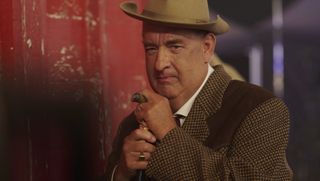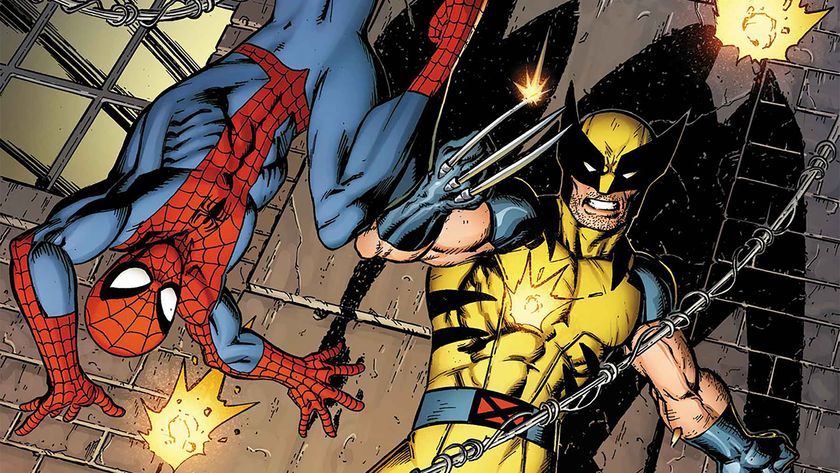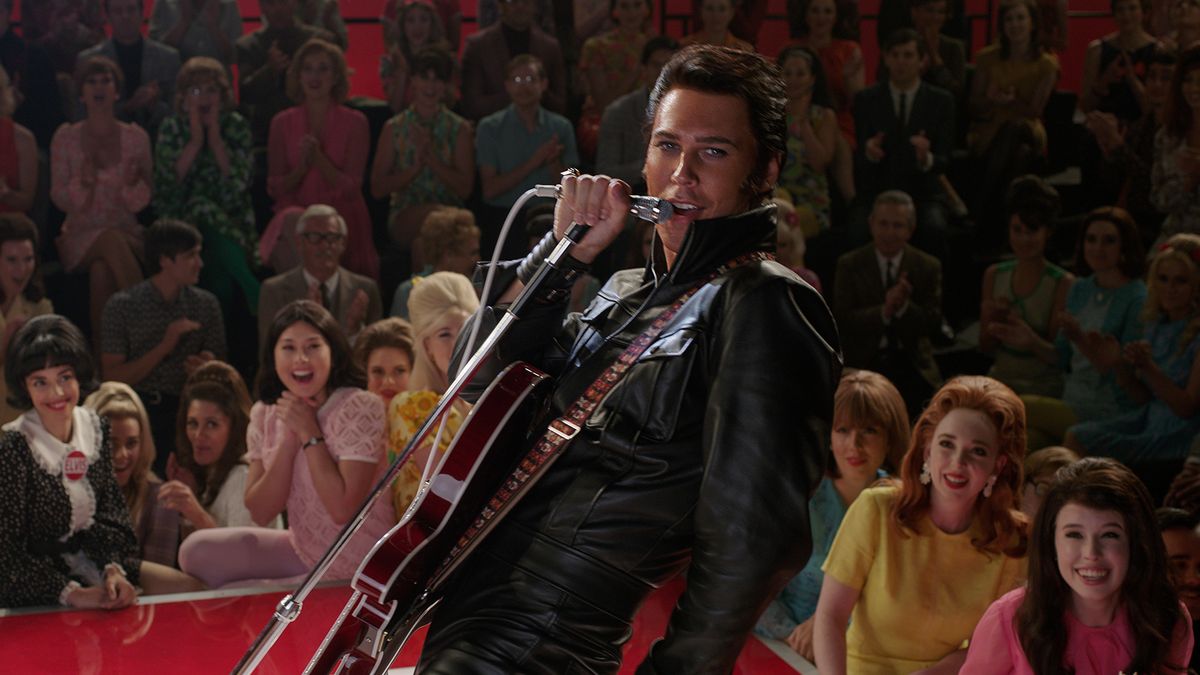12DOVE Verdict
The toe-tapping beats of this full-throated biopic will be familiar in more ways than one but Baz Luhrmann, like Elvis, knows how to put on a great show. Butler’s Best Actor chatter starts here.
Why you can trust 12DOVE
Still considered the best-selling solo music artist of all time, and a cultural force like no other, the question of any big-screen Elvis biopic isn’t ‘why make it?’ but ‘why has it taken this long?’ Spanning 30 years of Elvis Aaron Presley’s tragically curtailed life, from formative early encounters with gospel and rhythm & blues music to his untimely death from heart disease at the age of just 42, Baz Luhurmann’s trad but terrifically enjoyable 'EP' biopic has swagger to spare, and a star-making central performance from Austin Butler as the undisputed King of Rock ’n’ Roll.
Much like Luhrmann’s last feature, 2013's The Great Gatsby, the story here is told with omniscient narration not by its title character, but one closely connected to him. In Gatsby it was Tobey Maguire’s Nick Carraway; here it’s Tom Hanks’ Col. Tom Parker, the devilish pioneer who managed Elvis for much of his career and was eventually revealed to have committed a form of financial abuse that kept Elvis in a gilded cage.
As the film opens, Parker is rushed to A&E in Las Vegas following a heart attack. With a view of the notorious International Hotel, where Elvis spent many of his later years in residency, from his hospital bed (immediately dispelling any doubt that Luhrmann will be operating with the subtlety of a rhinestone jumpsuit), Parker recounts the Elvis story with a delusional insistence that the King’s death wasn’t his fault, even pointing the finger of blame at his legion of fans whose adoration demanded so much from Elvis.
It’s a novel device, the film returning to Parker’s perspective intermittently. But for the most part this is a reprise of the music-biopic format lampooned so thoroughly in Walk Hard: The Dewey Cox Story that it practically killed off the genre for a time. There’s the humble beginnings, the rise to fame, the run-ins with the law, drugs, divorce, the comeback, and ultimately the undoing. Luhrmann’s solution to the biopic problem is a level of unbridled brio and infectious enthusiasm for his subject that makes the familiarity of some structural and storytelling choices practically irrelevant.
In Gatsby, Luhrmann’s hyperactive style always felt at odds with F. Scott Fitzgerald’s sardonic novel, but one of cinema’s great, sincere showmen has found more fitting subject matter in Ol’ Snake Hips. Luhrmann tackles the story with exuberant aplomb, deploying every device up his flared sleeve, including snazzy transitions, hallucinatory visions, anachronistic soundtrack choices, animated flashbacks, corkscrew camerawork, swooping CG establishing shots, crash zooms, split screens, archive footage and music-video quick cuts to ensure the energy never sags, especially when Elvis is on stage, whipping his largely female fanbase into a gleefully silly mass hysteria. But Luhrmann manages to strike just the right balance of bombast and character beats here. It never matches the exhilarating radicalism of Romeo + Juliet, but it’s Luhrmann’s most successful work since Moulin Rouge.
Elvis was made with the blessing of the Presley estate, if not the direct involvement of the family, who have recently spoken out in support of the film. The cynical expectation may be another whitewashed hagiography akin to Bohemian Rhapsody. It isn’t that, but neither is EP’s life tackled in Rocketman-style warts ’n’ all fashion. Instead, Elvis occupies a comfortably inoffensive middle ground that doesn’t feel like the Elvis story with the edges completely shorn off, but neither does it get truly under the King’s skin.
Luhrmann, ultimately, is content to present and preserve the Elvis myth. The idea that the greatest rock ’n’ roll musician of the 20th century was ‘born’ on stage in a bolt of lightning. That his swinging hips and wiggling pinky were simply too sexy and too progressive (he was pals with B.B. King) for the puritanical America of the 1950s. That his eventual undoing was the consequence of Col. Tom Parker’s manipulations, not the complex web of reasons that bring people low.

But it works, not least because Austin Butler – best known in cineaste circles as the Manson acolyte who gets his gonads gnashed by Brandy the dog in Once Upon A Time… In Hollywood – is a revelation as EP. He has the immaculate coiffure, cherubic good looks, twitchy mannerisms, aphrodisiac dance moves and laconic drawl down to an eerie level of accuracy that’ll leave you all shook up. Just like Elvis, Butler leaves nothing on the stage in the film’s many, rousingly energetic performance sequences that, miraculously, never feel like mime acts. Early enthusiasm eventually gives way to poignant tragedy, Butler imbuing Elvis with a heartbreaking vulnerability in his scenes outside the spotlight.
Elvis’ superpower is music, we’re told. In contrast, Parker claims “there are some who’d make me out to be the villain of this here story” in a way that makes it clear they’re onto something. There are complex, moving exchanges between the pair, who shared an almost familial bond, that help explain how Elvis and everyone in his inner circle could be so comprehensively taken in by a man with such mercenary motivations. Hanks, it must be said, doesn’t exactly disappear into the larger-than-life role of Parker. Buried under heavy prosthetics and taking a big, not entirely successful, swing with Parker’s unplaceable Germanic-Dutch accent, it rarely feels like you’re watching a character, and not Hanks giving a capital-P performance.
Some will no doubt take umbrage with the runtime, clocking in as it does at over 150 minutes, but a lack of incident is not the problem – there’s enough to Elvis’ story to fill 150 hours. The issue is that much of interest is skipped over by well-edited montages, or a time jump bridged by a newspaper headline to fill in the gaps. Elvis’s initial rise to chart-topping fame is relegated to one such montage, as are most of his Hollywood years. The ultimate sense is that nothing happens gradually in Elvis’ life – this is a life story in fast forward, but such is the energy that Luhrmann cultivates. At least it’s never boring.
Unlike the Carpenter/Kurt Russell TV movie, which finishes on a high in 1970, seven years before his death, Luhrmann's film covers Elvis’s life up to the bitter end. Choosing good taste over sensationalism for the final chapter in EP’s story, Butler is seen only once in later-life-Elvis prosthetics and fatsuit, sitting behind a piano for an atypically static performance of Unchained Melody, hammering home that, despite the lithe young man who electrified the world being long gone, even in his final days Elvis was a truly gifted vocalist and musician. It’s to the film’s credit that as Luhrmann brazenly cuts to real footage of the same Elvis performance it doesn’t jar, or reveal the film as some unworthy facsimile. The King is alive and well, at least on screen.
Elvis is out now! For more, check out our list of the most exciting upcoming movies heading your way soon.
More info
| Genre | Drama |

I'm the Deputy Editor at Total Film magazine, overseeing the features section of every issue where you can read exclusive, in-depth interviews and see first-look images from the biggest films. I was previously the News Editor at sci-fi, fantasy and horror movie bible SFX. You'll find my name on news, reviews, and features covering every type of movie, from the latest French arthouse release to the biggest Hollywood blockbuster. My work has also featured in Official PlayStation Magazine and Edge.

"A really sad day for speedrunning": The world's fastest gamers brace for brace for a new Twitch storage limit on "all highlights and uploads"

Spider-Man and Wolverine are teaming up in their own ongoing series that ties into their secret shared history

Marvel celebrates 50 years since Giant-Size X-Men #1 by sending Ms. Marvel Kamala Khan through time in an event that "redefines mutant history forever"
Most Popular




